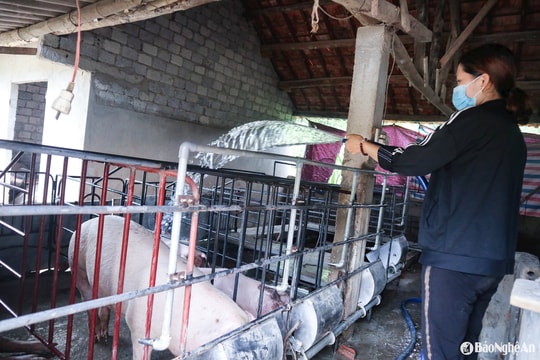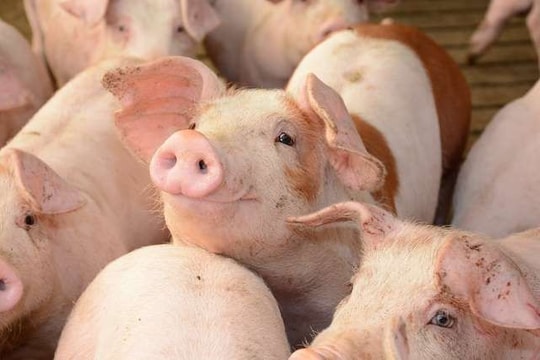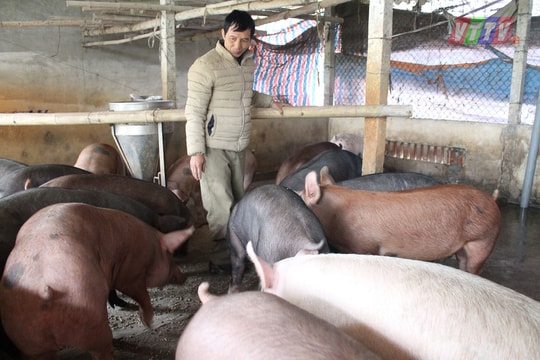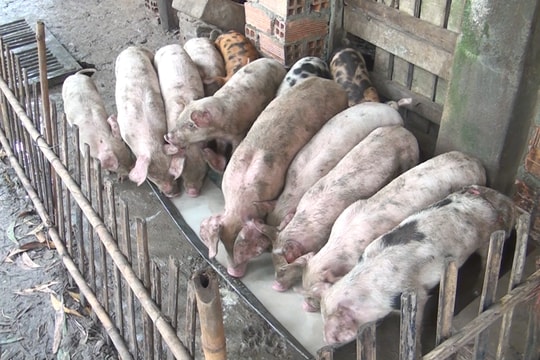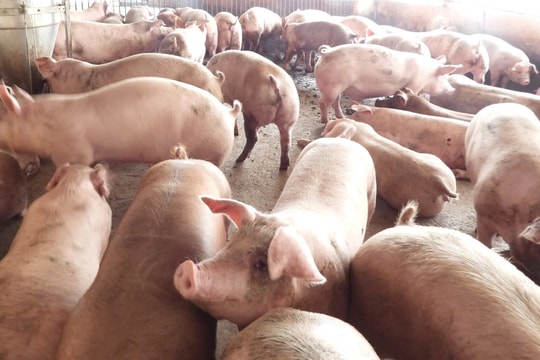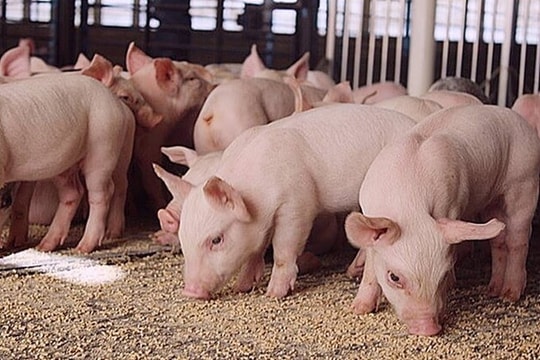Pigs 'waiting for price' from China
After the 2017 Lunar New Year, the price of live pigs began to increase slightly again. However, due to deep losses before the New Year, many farmers still tried to "hoard" pigs, waiting for the price to go up to recoup.
Currently, the price of live pigs in the Southeast market fluctuates around 35,000 VND/kg. However, according to some pig purchasing businesses in Dong Nai - the locality with the largest pig population in the country, farmers are still asking for prices at 37,000 - 38,000 VND/kg, causing this consumption channel to operate at a standstill.
Waiting for price from… China
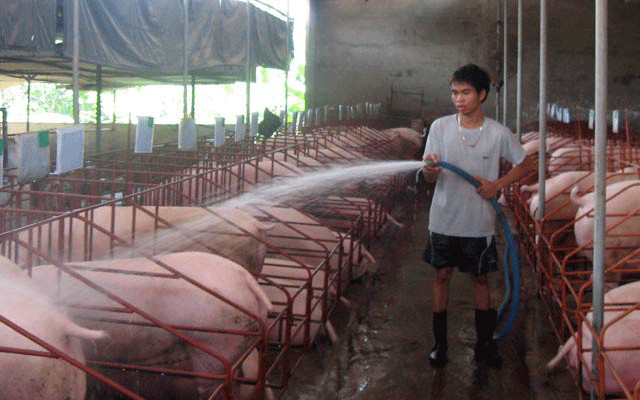 |
| Pig prices have increased but many pig farmers in Thong Nhat district (Dong Nai) do not want to sell their pigs. Photo: KH |
Mr. Phan Khac Dung - a trader with 20 years of experience buying pigs in Dong Nai, commented when talking about the rising price of live pigs but farmers still hoarding goods to push up prices: "Almost since after Tet until now, we have only been buying and selling pigs sparingly. Calling any farm, they push the price 5 - 7 times higher than the market price (1 lai = 1,000 VND - PV). Now pig farmers are just waiting for prices from Chinese traders."
Indeed, according to the reporter's investigation, in Dong Nai there is a phenomenon of pig farmers hoarding goods to wait for prices. According to Mr. Nguyen Kim Doan - Vice President of Dong Nai Livestock Association, this is the common mentality of pig farmers. "For the past two weeks, pig farmers have heard that China is opening its market. At the same time, CP Vietnam Livestock Joint Stock Company is also collecting pigs in the system to export to China, making farmers believe that the price of live pigs will increase sooner or later, so they hoard goods" - Mr. Doan said.
Mr. Dinh Viet Thinh, a farmer in Gia Kiem commune (Thong Nhat, Dong Nai) said that he is raising 100 pigs and more than ten sows. Before Tet, he saw that the price of live pigs had dropped too much so he sold 50 pigs. However, after Tet, he saw that the price of live pigs had increased, so he stopped selling to wait and see if the price would increase further. "Currently, I have about 50 pigs weighing about 100kg each. I have suffered a lot of losses from this batch of pigs. Now that I hear that the price of pigs has increased, I want to keep the pigsty and wait until the price is good to sell them to recoup the loss," said Mr. Thinh.
Meanwhile, in Bao Hoa commune (Xuan Loc, Dong Nai) - a commune that before Tet still "rescued" the remaining pigs by slaughtering and sharing them for Tet, is now also hoarding goods waiting for prices to rise. According to Mr. Van Quang Giang - Vice Chairman of the Commune Farmers' Association, the whole commune raised more than 50,000 pigs during the last Tet season. However, more than 50% of the pigs in the commune have not been sold. "There are still many pigs left, but people are still trying to hoard goods waiting for prices to increase, because now even if they sell them, they will still lose money" - Mr. Giang said.
Need to proactively sell
According to Mr. Phan Minh Bau - Deputy Director of the Department of Agriculture and Rural Development of Dong Nai province, the province currently has about 400,000 pigs weighing 70kg or more. The reason for such a large amount of pigs remaining is due to the "hot" herd growth in the past year. Accordingly, if in 2015 Dong Nai's total pig herd was 1.7 million, in 2016 it suddenly increased to 2.1 million, leading to a "shocking" increase in supply when the Chinese market stopped importing goods.
According to Mr. Nguyen Kim Doan, the price has increased but farmers are not willing to sell their remaining pigs. This is too risky because the market has not shown any signs of improvement, while people have to continue to invest capital to buy pig feed. "Although the situation of overloaded pigs (1.2 - 1.5 quintals/head) in the population is not as "hot" as it was about 2 months ago, if people do not sell their pigs in a few months, many farms will have to mortgage their assets to maintain their farming activities," said Mr. Doan. Recently, to deal with the remaining pigs, the Department of Agriculture and Rural Development of Dong Nai has called on businesses in the processing industry to increase pig purchases. On the other hand, farmers must look at the market to promptly adjust the size of their herds, avoiding the risk of losing more and more money as they raise them, and must proactively sell pigs early instead of storing pigs to sell to China.
According to the Dong Nai Livestock Association, after this pig price crisis, many small-scale pig farmers no longer have capital to maintain and have had to "hang up" their pig pens. Large-scale pig farms are considering reducing their herds to avoid losses. "In the current "unstable" price situation, if you see the price, you should accept selling even if you lose this batch of pigs, because you don't know if the price of pigs will increase further or not, but certainly if you keep the goods, you will lose more money on feed. People raise several batches of pigs a year, doing business means gains and losses, if you lose this batch of pigs, you have to find a way to make up for the next batch" - Mr. Van Quang Giang offered a solution.
Pork butchered by intermediaries to raise price According to information from the Agricultural Market Steering Committee (Ministry of Agriculture and Rural Development), the domestic price of live pigs increased by 2,000 - 3,000 VND/kg last week due to the sharp increase in the amount of goods going to China during the Lunar New Year holidays. Specifically, the wholesale price of crossbred pigs in Hanoi on February 10 was 32,000 VND/kg; the wholesale price of super lean pigs reached 38,000 VND/kg. The sharp decline in the price of live pigs for a long time has caused heavy losses for farmers. However, according to estimates from the General Statistics Office, the total number of pigs in the country in January 2017 still increased by 4.7 - 5.2% compared to the same period in 2016. The main reason is that farmers expanded their herds in the last months of 2016 for export, but China suddenly stopped purchasing, causing a surplus of domestic pigs. Thien Ngan |
According to Tran Dang/danviet
| RELATED NEWS |
|---|

